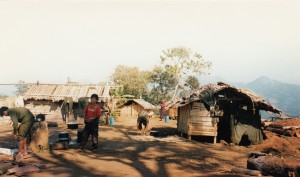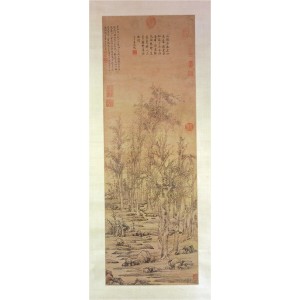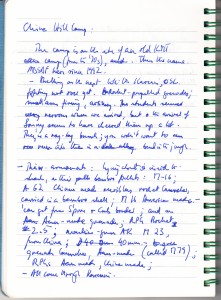For me the most direct aspect of the blog’s appeal is its hospitality to visual imagery. I am an inveterate snapshot-taker and have accumulated a large trove of pictures over the years. By no stretch would I call myself a ‘photographer’

– my pictures are at best competent and usually a good deal less than that.
But often, when taking pictures,

I also make notes. On their own, neither have any particular value, but joined together they reinforce each other.
[China Hill Camp: The camp is on the site of an old KMT camp (from the ’70s). Thus the name…]
The conjunction of word and image represents a way of apprehending the world – a way that comes naturally to me. Apart from the blog there exists no other medium in which their publication would be feasible. To print them together would be prohibitively expensive.
Besides, the experience of turning a page and scrolling down a screen are not the same: the attribute that establishes the blog as a form unto itself is precisely its resistance to print. The print version of this article, for example, will have considerably less content than the post that will appear on my website. This is because the printed version will not contain any images. Does that mean that the meaning of the two versions will differ? The answer is yes, at least in the sense that the force of the argument will not be the same in both. Only a fanatical logocentrist could argue otherwise.
The free-standing blog differs also from Facebook, MySpace and other hosted pages. Those pages function within formats provided by corporations; the functions of commercial and social utility sit heavily upon them. The blog is to a much greater degree shaped by the tastes of its maker. With the pressures of the Here-and-Now removed, it is also one of the few virtual forms that is no longer primarily utilitarian.

If the blog, as a form, has any true predecessor it is the painted scroll. Not only does the eye follow the ‘content’ in a similar fashion, but scrolls also served as records, narratives, anouncements and so on. Painted scrolls even had the equivalent of a ‘comments’ feature, with interpolations and seal-marks being added over the centuries.
But most of all, scrolls represent what may well be the most supremely beautiful pairings of text and image that have ever been created. They have set the standard to which blogs must aspire.

Nothing that I have said in these posts is intended to deny or diminish the strengths of the print media. The process of publishing in print consists of a collaboration between authors and a great number of others: editors, agents, book-designers, jacket-artists, proof-correctors and so on. Every one of these people puts something into the process and the finished works are, without a doubt, vastly the better for it. This process adds enormously to the quality, value and significance of books. That is why the institutions of print will not disappear: they are irreplaceable.
Nor are books the only beneficiaries of the publication process: authors too gain a great deal from it. In dealing with editors, translators, agents, fact-checkers, proof-correctors and so on, I have had the benefit of a continuing education that has lasted for decades. My blog would not be possible without this education.
But all this being said, I must admit that one of the most exhilarating aspects of blogging is that it does not require any intermediaries. It is a form of expression that needs neither reason nor reward, neither audience nor cause – and as such it is about as pure and as pleasureable as any that can be imagined.
Having tasted this freedom I find that it has become much harder to write for newspapers and magazines. To deal with even the nicest and most accommodating editor is awkward in comparison to dealing with oneself. The time lag between writing and publication, even if it is just a matter of a day or two, seems very long in comparison to the pleasure of posting a piece within minutes of writing and editing it.
But that’s just it: nothing about blogging is as surprising as the sheer pleasure of it.


“needs neither reason nor reward, neither audience nor cause” I agree with this point wholeheartedly. Just that some take the liberty to write without ‘reason.’ But yes, it is easier to deal with oneself than with an editor who feels the piece is too long, too this, too that..